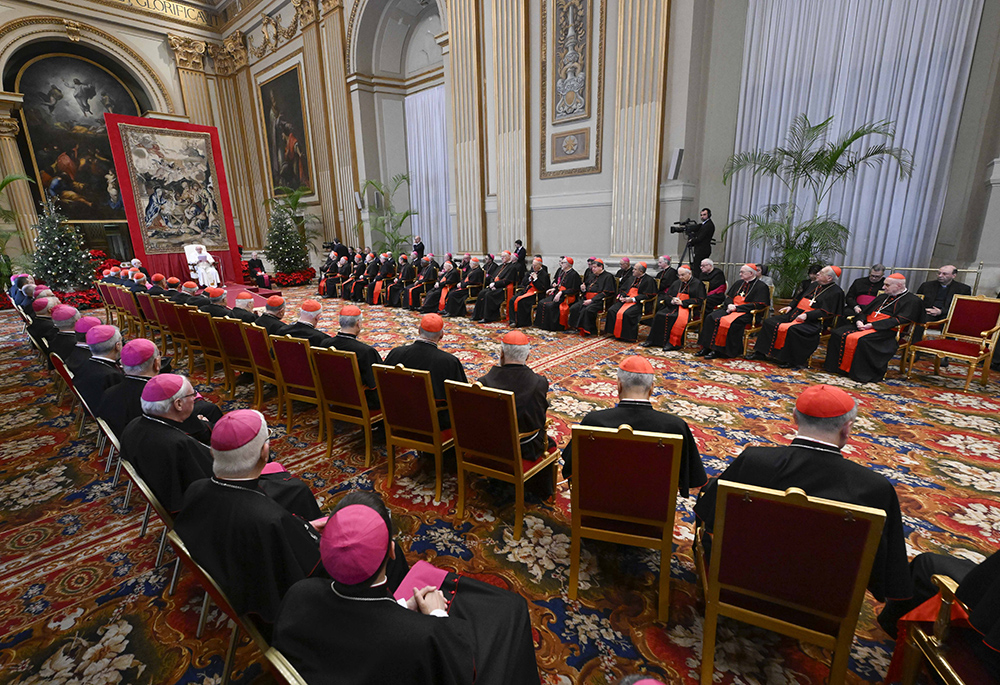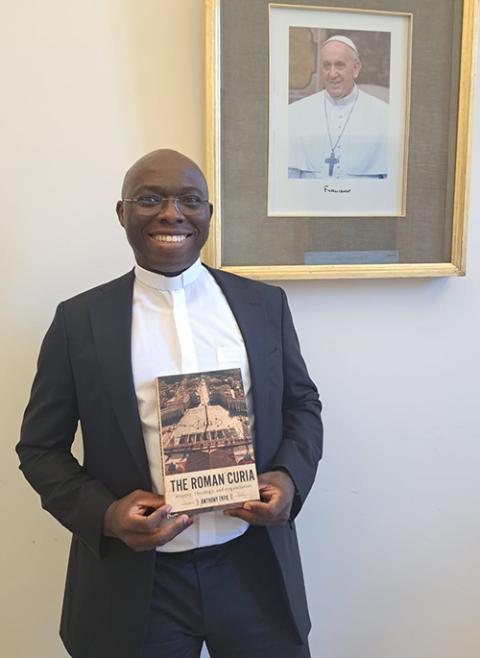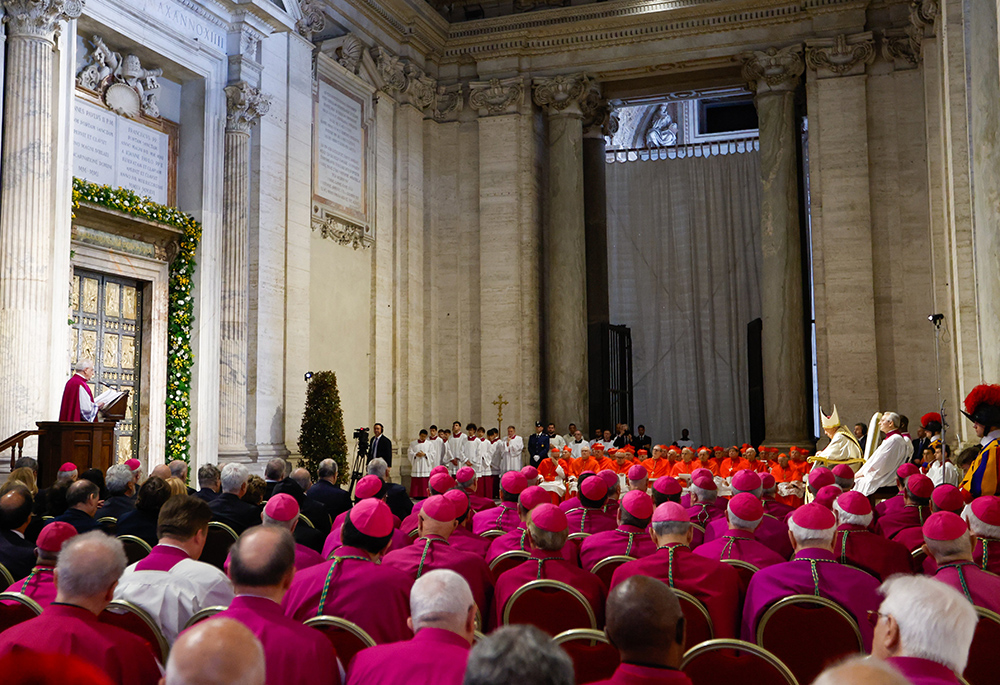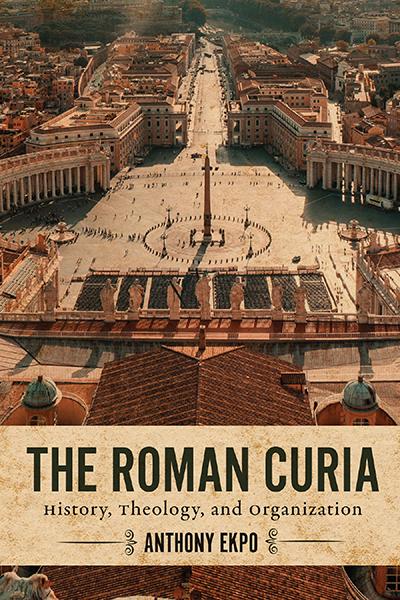
Pope Francis speaks to cardinals and top officials of the Roman Curia in the Vatican's Hall of Blessings Dec. 21, 2023. In his traditional pre-Christmas speech, the pope focused on the need for Curia officials to learn to listen and discern as they help the church move forward. (CNS/Vatican Media)
The antiquated and often secret inner workings of the Vatican's bureaucracy have been compared to the government of North Korea in its difficulty to make sense of and understand.
That challenge, however, is a bit easier now thanks to a new book penned by a true Vatican insider that has made the complicated web of Vatican operations much more accessible to outsiders.
In The Roman Curia: History, Theology, and Organization, just out by Georgetown University Press, Msgr. Anthony Ekpo admits that for centuries, the work of the Vatican's governance has often perplexed Catholics and non-Catholics alike, leaving some to ask: "Can anything good come from the Roman Curia?"

Msgr. Anthony Ekpo (courtesy of Anthony Ekpo)
That would be a fair sentiment given the barrage of headlines in recent years over the Vatican's questionable real estate dealings and financial investments and church officials that have been plagued with corruption allegations.
Ekpo's answer to that question is a defiant "yes" — but with the caveat that one must understand that it is an institution that is always in need of reform, as are those who work inside of it.
When Pope Francis was elected in 2013, one of his top priorities was to overhaul the Vatican's central bureaucracy. In the general congregations — meetings held by the cardinals before the election of a new pope — many voiced shared concern about the need to improve and decentralize church governance.
Francis took up that task in earnest and a multi-process consultation led to the 2022 publication of a new Apostolic Constitution, the first revision of the structures of the Roman Curia in over 30 years. Under the title of Praedicate Evangelium ("Preach the Gospel"), the new document stresses that evangelization is the central task of the church.

Pope Francis, members of the Roman Curia and other church officials listen as Msgr. Leonardo Sapienza reads excerpts of Spes Non Confundit, ("Hope Does Not Disappoint"), his document proclaiming the Holy Year 2025, during a ceremony in front of the Holy Door of St. Peter's Basilica May 9 at the Vatican. (CNS/Lola Gomez)
"Francis' emphasis on evangelization as the chief mission of the Roman Curia has been a revolutionary idea, although in many ways it is a natural continuation of his leadership," Ekpo told me. "This evangelization involves individual and communal conversion of all curial officials as well as welcoming and developing a new way of thinking: that is one of synodality and subsidiarity; the understanding that we are all companions on the journey to heaven."
Ekpo is well poised to serve as a reader's guide on how life works inside the Vatican: a native of Nigeria, with a doctorate in systematic theology from Australian Catholic University and a canon law degree from Rome's Pontifical Gregorian University, he previously worked as an official in the section for general affairs of the Vatican's Secretariat of State until his appointment as undersecretary of the Dicastery for Promoting Integral Human Development in 2023.
In other words, he possesses the trifecta of theology, law and practical experience on the inside that allows him to make intelligible what is often unintelligible.
Advertisement
Written in an accessible style, Ekpo says the book is meant to serve as a resource for students, curial officials, seminarians, ambassadors, academics and, of course, journalists. For years, Jesuit Fr. Thomas Reese's 1998 book, Inside the Vatican: The Politics and Organization of the Catholic Church, has been an indispensable English-language reference book for making sense of the Vatican. For this reporter, Ekpo's volume now sits right next to it, in quick reach.
But the added bonus that The Roman Curia offers is that it's the first comprehensive treatment in the English language to reckon with the reforms of the Francis papacy, and in particular, the new Vatican constitution.

Cover to The Roman Curia: History, Theology, and Organization by Msgr. Anthony Ekpo (Courtesy of Georgetown University Press)
While clocking in at less than 200 pages, the book offers a forensic look at the evolution of Praedicate Evangelium from past constitutions, its many novelties — including the ability for lay men and women to run Vatican departments — the reprioritization of evangelization as this pope's key goal and simple explanations of how the many offices responsible for carrying out this work are supposed to function.
"Through his actions, Pope Francis has underscored this even before the arrival of Praedicate Evangelium, and he has continuously shown that the goal of power, and especially its exercise in the church, is service," Ekpo told me. "Praedicate Evangelium is, therefore, in many ways the articulation of the longstanding vision of Pope Francis for the Roman Curia."
Given his work inside the Curia for almost a decade, Ekpo has the advantage of being someone who has both sat at the pope's side offering English language translations for high-level meetings and now is part of the leadership of the Vatican's largest department, offering him a front row seat of what does and doesn't work inside the place.
Working closely with the pope, Ekpo says that Francis' "personality and style testify that he lives the reform, leading by example." And now, at the Vatican's mega-dicastery, he says his work is to collaborate with its prefect and other superiors to engage in a "listening process with the bishops throughout the world and supporting them in removing obstacles that impede integral human development in any way, shape or form."
"A combination of my experiences in both curial institutions has helped to make me a better priest, who is doing his best to serve the Holy Father and the universal church," he said.
At only 42 years old, Ekpo brings to both readers and the institution a rare combination of youthful energy and learned wisdom. And his publication of The Roman Curia evidences not only his expertise of the subject matter at hand, but also signals his own rising prominence inside of the place.






